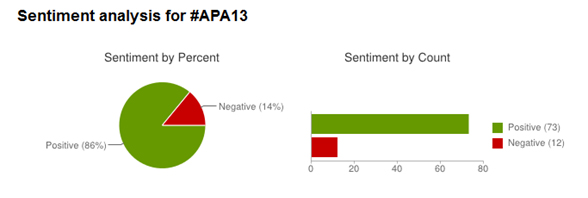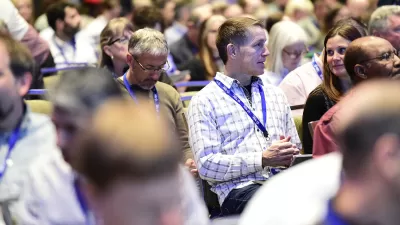Every year we analyze all of the tweets from the APA Conference and tell you about the trends in planning. With more than 1,000 people tweeting from the APA Conference, there is a lot of great ideas, links, and blogs that we can all learn from.
Like many others at the APA conference in Chicago I learned a lot. This is the third year that Brittany Kubinski @b_kubinski and I @evanscowley have analyzed the tweets from the APA National Conference (see our analysis of the 2012 conference and 2011 conference with @cubitplanning). Brittany and I decided to do the same this year and compare what trends have continued and what new trends have emerged. There were two competing hashtags, #APA2013 and #APA13. We collected all the tweets on both hashtags. We excluded all of the tweets announcing events and focused on the substantive tweets. The attendees at APA were active tweeting throughout the conference generating 5,083 tweets from 1,089 people. Most were attending the conference, but several were following along from a distance. Of the 5,200 people attending 21 percent were tweeting, up from the 15 percent tweeting last year. This is a steady climb upwards with 203 people tweeting 2011, 691 in 2012 and 1,089 at this year’s conference. The number of tweets almost doubled to 5,083 from 2,818 in 2012. And I noticed a major uptick in the number of pictures shared at the conference. The most frequently shared image was the Chicago Planning Tour mobile app, pictured here., provided by Parsons Brinckerhoff Sharing pictures of slides was popular, for example this slide linking transportation and health. A favorite was this great slide capturing the essence of how we are different from developers.
Topics of Conversation
There were several topics that were greatly discussed. Since the conference was in Chicago, the city was a common point of conversation. A number of topics that were highly discussed at the 2012 conference continued at the 2013 conference including transportation, data, and public participation.. A number of topics were new among tweets at the 2013 conference, for example “aging” and “schools” were hot topics at this year’s conference.
|
Topic |
# of Tweets at 2013 APA |
Rank 2012 |
Rank 2011 |
|
City Planning |
472 |
33 |
|
|
Transportation |
417 |
4 |
6 |
|
Apps |
331 |
16 |
|
|
Chicago |
322 |
41 |
|
|
Economic Development |
240 |
36 |
15 |
|
Technology |
141 |
14 |
4 |
|
Data |
134 |
7 |
|
|
Biking |
123 |
28 |
|
|
Water |
107 |
13 |
50 |
|
Unconference |
97 |
||
|
Civic |
74 |
34 |
14 |
|
Food |
69 |
10 |
3 |
|
Public Participation |
67 |
5 |
8 |
|
Schools |
61 |
||
|
Walking |
59 |
||
|
Aging |
57 |
||
|
Infrastructure |
56 |
30 |
23 |
|
Development |
55 |
32 |
32 |
|
Zoning |
53 |
27 |
18 |
|
Complete Streets |
48 |
50 |
|
|
Sustainability |
47 |
17 |
7 |
|
Downtown |
46 |
||
|
Neighborhood |
46 |
||
|
Smart Growth |
42 |
22 |
48 |
|
Social Media |
42 |
37 |
2 |
Below are the 25 most retweeted tweets of the conference (excluding retweets about announcing an event or session). For Twitter newbies, retweeting is like forwarding an email to people you know. RT @evanscowley means that you are forwarding a Tweet from a user, in this example me. Thirty percent of the total #APA13 tweets were retweets (so interesting that someone decided to forward it on).
Tweet |
# of RTs |
|
RT @UrbanPolicy: To appeal to young & hip shoppers, "Main street" style malls are building fake apartments on 2 floors above #apa13 #CPlan v @_chrishamby |
15 |
|
RT @urbandata: JSK: "Making your city attractive is an economic-development strategy." http://t.co/IlBR4M945C #APA13 #CPlan #econdev v @Richard_Florida |
13 |
|
RT @mitchell_silver: Myth: Towns/cities/regions can compete if we lower the cost of doing business. - Xav Briggs #APA13 |
12 |
|
RT @chrisjamesdrew: The next economy and why planning matters. #apa13 #urbanplanning #onpoli CC @DrEricHoskins @Glen4ONT http://t.co/trPvI5T0M0 |
11 |
|
RT @APA_Planning: Coming to Chicago for #APA13? Download ‘Planners Guide to Chicago’ — over 2,000 people have checked it out so far: http://t.co/92UPDGn9Q3 |
10 |
|
RT @emilymbadger: Interesting question: What does smart growth mean for communities that aren't growing? #apa2013 |
10 |
|
RT @NextCityOrg: This week's Forefront story, a deep dive into Chicago Infrastructure Trust, is available early (and free) for #APA13 http://t.co/wHJdJ3Y12t |
9 |
|
RT @WalkFarce: Funny watching all the planners leave #apa13 in taxis when the 2nd largest transit system in the US is at their feet #hypocrites |
9 |
|
RT @ChicagosMayor: What's next for Chicago's #opendata? http://t.co/f3IsW4AcLv cc @chicagocdo @ChicagoCTO #apa13 |
8 |
|
RT @EvansCowley: Want a central place for all the links tweeted at #apa13 Stay tuned I will analyze and post on @planetizen at the end of the week. |
8 |
|
RT @mitchell_silver: #APA13 in Chicago was one of the best conferences I can remember since NYC in 2000. Excellent sessions, topics and events. @APA_Planning |
8 |
|
RT @stevevance: Chicago Bike Guide: For everyone who is biking in Chicago or wants to bike in Chicago, like those here for #APA13 http://t.co/C7RR3Phvca |
8 |
|
RT @chrisjamesdrew: Wonderful: 10 principles for creating age-friendly communities at the #APA13 conference. CC @Deb_Matthews #onpoli http://t.co/55LjA6cTur |
7 |
|
RT @emaleigh: Listening to @Kaid_at_NRDC talk smart growth in poor urban communities. Nice opening turns convo on its head #APA13 http://t.co/NnjDivUaaD |
7 |
|
RT @FakeAPA: Make no mistake: If you like reading @AtlanticCities, then you'll LOVE going to planning school. #apa13 #apap2013 |
7 |
|
RT @GeneXusUSA: #APA13 attendees download the Chicago Planning Tour App! Powered by @genexususa Sponsored by @PBworld http://t.co/Ag2Yh5jsfk |
7 |
|
RT @mitchell_silver: Over 5,000 are arriving in Chicago for #APA13. This is going to be an exciting few days. http://t.co/NrRYcKK2j0 |
7 |
|
RT @urbandata: Ideally, data to improve #cities must be relevant, easy to analyze, accurate, and updated in real time. #apa13 #apabigdata MT @ethanstucke |
7 |
|
RT @lentztweet: Interesting stat, 1 in 3 babies born today will live to be 100. That has some planning implications. #APA13 |
6 |
|
RT @NextCityOrg: "Choosing where to live... forget homogeneity, diversity is in..." David Dixon at #APA13. That means big change for poor urban communities. |
6 |
|
RT @stevevance: In Chicago for #APA13? Read @streetsblogCHI's "Irreverent Guide to Planning Highlights & Lowlights" http://t.co/EEEMG02nsf |
6 |
|
RT @VAplanprez: Mitchell Silver: Downtown is the new golf course--it is where the deals that matter get done. #APA13 |
6 |
|
RT @APA_Planning: Can’t join us in Chicago for #APA13 but still want to know what’s happening? Check out live conference Twitter feed http://t.co/YXHdzEWzUo |
5 |
|
RT @APAMississippi: Incremental change requires patience, but amounts to large scale innovation over time. #APA13 |
5 |
|
RT @ChicagoDOT: RT @mphurleyaicp: Best swag of the conference? Hot off the press: Complete Streets Chicago Design Guidelines. #APA13 @ChicagoDOT... |
5 |
For example “next economy”, “smart growth” and “open data”. My favorite “Presidential Pardon for Euclidean Zoning” became the buzz word heard both on and offline. Other key words that captured attention in tweets such as “tactical urbanism” and “place making”.
The Meaning of Our Tweets
Sentiment analysis helps us to understand the meaning conveyed in a large group of tweets. To learn more about sentiment analysis I have a publicly available article on the topic. What are the sentiments that planners are expressing when tweeting about the conference? Are we angry, happy, or something totally different? We found that we are a positive bunch, with 86% of the last 85 tweets expressing positive sentiment. Our analysis of all tweets from the conference, using a language analysis software, expressed key sentiments. We are action oriented with a strong sense of the present, speaking about things happening in current time and space (not surprising for a conference). Our tweets use “we” and express social and positive emotions. We are expressing pride in our achievements. All of these sentiments embrace the essence of planning. This is exactly what one would hope to see at a conference where the use of Twitter is meant to support social interaction between unknown people with shared interests.

Source: http://www.sentiment140.com/
Who Participated?
A total of 1,089 different planners tweeted during the conference which is a wonderful number of participants, but what was the level of equality in participations. How many people were heavy Tweeters like me and how many were light users? Similar to other research about the use of social media a small number of people dominate the conversations with 4.5 percent of the users sending out 45 percent of the tweets. BUT, we can also see that we had a wide array of users with many participating one or a few times. For example, 28 percent of the tweets came from the 83 percent of participants who tweeted five or fewer times.
There were clearly key influencers at the conference whose tweets were frequently retweeted. The top 15 influencers at the conference included: @chrisjamesdrew, @EvansCowley, @Peoplingplaces, @AbbyMPC, @Dcmilz, @japrovo, @Metroplanners, @Lentztweet, @SensibleStreets, @DrUrbanPolicy, @_chrishamby, @Dellarucker, @alexbaca, @cookry, and @egibsonplan. A number of these people are not just influencers at the conference, but are influencers all year round with more than 1,000 followers on Twitter. @chrisjamesdrew (tweeting on transportation), @EvansCowley (tweeting on technology), @Metroplanners (tweeting for the Chicago Metropolitan Planning Council), and @alexbaca (tweeting on transportation, technology and other topics),
Blogging at the Conference
There was as noticeable uptick in attendees who blogged from the conference. Below are links to a number of the blogs created about sessions at the conference (I may have missed a few). This allowed attendees and followers to get the inside story on what was happening in the many sessions at the conference.
Christopher Pollard (@CRVanPollard) wrote a blog post for the unconference, Participation Thoughts on Unconference on Intelligent Cities. Chi.Streets.Blog shared an Irreverent Guide to Chicago Planning Highlights and Lowlights. Sustainable Communities Collective shared a blog post called Transit Everyone on how to create better systems for people accessing on foot or bike and overcome the obstacles that can undermine a transit system. Elizabeth Felter, APA NOAA Digital Coast Fellow shared a post on the Burnham Forum on Big Ideas. And finally, Jonathan Nettler shared some closing remarks on APA 2013: Dispatches from Chicago.
Resources from the Conference
Conference attendees did a great job sharing links to all kinds of content. The volume of links was overwhelming, so we took those that were retweeted and have grouped the various links by topic below.
Aging:
- 10 Principals for Creating Age Friendly Communities: http://blog.aarp.org/2013/04/15/10-principles-for-creating-age-friendly-communities/
- Burial Crisis: http://www.theatlanticcities.com/housing/2012/10/americas-looming-burial-crisis/3752/
Big Data:
- The Digital City: http://untappedcities.com/2013/04/08/apa-chicago-conference-digital-city/
- What's next for Chicago's open data strategy? http://www.chicagobusiness.com/article/20130416/BLOGS08/130419849/
- Local Data: http://localdata.com/
- Open Government Initiative: http://opengovernmentinitiative.org/
Biking:
- Chicago Bike Guide: http://bikechi.com/
- Chicago Bike Guide: http://www.offlinebikemap.com/
- Bike Corrals Poster: http://www.altaplanning.com/App_Content/files/ALTA_APA_BikeCorralPoster.pdf
- Chicago Bike Rentals: http://bikechi.com/chicago/repairrental.html
Chicago:
- Chicago Planning Tour: http://www.chicagoplanningtour.com/
- Rahm Emanuel Has an Idea: http://nextcity.org/forefront/view/rahm-emanuel-has-an-idea
- Chicago Streets Blog: http://chi.streetsblog.org/
- Chicago Mobile Apps: http://blogs.planning.org/conference/2013/04/11/get-mobile-two-new-must-have-apps-for-chicago/
- Guide to Chicago: http://chi.streetsblog.org/2013/04/13/streetsblogs-irreverent-guide-to-chicago-planning-highlights-and-lowlights/
- Chicago Pedestrian Planning: http://m.theatlanticcities.com/commute/2013/04/chicago-commits-put-pedestrians-first-transportation-planning/5256/
- Chicago’s Megaloop: http://www.chicagobusiness.com/article/20130302/ISSUE01/303029987/
- History of Blues Clubs in Chicago: http://www.encyclopedia.chicagohistory.org/pages/1764.html
Crowdfunding:
- Brickstarter: http://brickstarter.org/
- Seed Chicago: http://www.kickstarter.com/pages/seedchicago
- TrafficCom: http://www.kickstarter.com/projects/trafficcom/trafficcom
- Bridge Crowdfunding: http://blog.buzzbuzzhome.com/2013/02/bridge-crowdfunding.html
Economy
- Xavier de Souza Briggs Keynote: http://prezi.com/9pmp1w45bepa/xbriggs-apa-keynote0413/
Environment:
- NOAA’s Digital Coast: http://www.csc.noaa.gov/digitalcoast/
- Species in the Chicago Region: http://environmentalcritique.wordpress.com/2013/04/15/how-many-species-in-the-chicago-wilderness-region/
- Cape Cod Commission Watershed: http://watershedmvp.org/
Neighborhoods:
- School Diversity: http://www.theatlanticcities.com/neighborhoods/2013/04/how-diverse-schools-could-help-fight-worst-effects-gentrification/5294/
- Retail Redlining: http://www.theatlanticcities.com/neighborhoods/2013/04/retail-redlining-one-most-pervasive-forms-racism-left-america/5311/
- Ways to Measure Neighborhoods: http://blog.walkscore.com/2013/04/choicemaps-new-way-to-measure-neighborhoods/
- Premature Subdivisions and What to do about them: http://www.lincolninst.edu/pubs/1761_Premature-Subdivisions-and-What-to-Do-About-Them
- Guide to Sustainable Neighborhoods: http://www.usgbc.org/resources/technical-guidance-manual-sustainable-neighborhoods
Public Participation:
- Civic Testing of Apps: http://www.smartchicagocollaborative.org/introducing-the-cut-group-get-paid-to-test-civic-apps/
- Mi Parque: http://miparquelv.wordpress.com/
- StreeSeen: http://streetseen.osu.edu
- TechniCity: http://technicity.osu.edu/
- Community Remarks: http://www.communityremarks.com
- Save Prentice: https://www.facebook.com/pages/Save-Prentice/146981851986833
Resiliency
- Resilient Communities Project: http://rcp.umn.edu/
Transportation
- Chicago Complete Streets Design Guidelines: http://www.cityofchicago.org/city/en/depts/cdot/provdrs/future_projects_andconcepts/news/2013/mar/complete_streetsdesignguidelines.html
- Lincoln Park Complete Streets Guidelines: http://www.bikewalklincolnpark.com/2013/04/complete-streets-guidelines-designing.html
- Value Capture: http://valuecapture.org/
- Choice Maps: http://blog.walkscore.com/2013/04/choicemaps-new-way-to-measure-neighborhoods/
Other Topics
- Direct Transfer: http://thedirecttransfer.com/
- Gun Violence: http://www.theatlantic.com/national/archive/2013/02/the-social-trends-driving-american-gangs-and-gun-violence/273170/
- What happens when you don’t win the Olympics: http://www.theatlanticcities.com/neighborhoods/2013/04/what-happens-olympic-plans-cities-dont-win-them/5284/
- TechniCity course: https://www.coursera.org/course/techcity
- Scenario Planning Tools: http://scenarioplanningtools.org/executive-summary/
- Comics: http://www.incidentalcomics.com/2012/07/suburban-planning.html
- Local Initiatives Support Organization: http://www.lisc.org/
- Cities of the Future: http://m.theglobeandmail.com/arts/why-the-cities-of-the-future-belong-to-the-millennial-generation/article11154532/?service=mobile
So are there any urban planning trends that surprised–either by being here or by not being here? What were the trends at the APA 2013 conference not captured by Twitter? Let me know in the comments.
My takeaway from the use of Twitter at the conference is that a significant number of people were able to use this medium to share and engage in conversations around planning topics that resonate with them. It provided a platform to engage in social conversations that helped people meet each other both on and off line.What more could we ask for from social media in a conference?I look forward to even more participation at the 2014 conference in Atlanta.

Planetizen Federal Action Tracker
A weekly monitor of how Trump’s orders and actions are impacting planners and planning in America.

Chicago’s Ghost Rails
Just beneath the surface of the modern city lie the remnants of its expansive early 20th-century streetcar system.

San Antonio and Austin are Fusing Into one Massive Megaregion
The region spanning the two central Texas cities is growing fast, posing challenges for local infrastructure and water supplies.

Since Zion's Shuttles Went Electric “The Smog is Gone”
Visitors to Zion National Park can enjoy the canyon via the nation’s first fully electric park shuttle system.

Trump Distributing DOT Safety Funds at 1/10 Rate of Biden
Funds for Safe Streets and other transportation safety and equity programs are being held up by administrative reviews and conflicts with the Trump administration’s priorities.

German Cities Subsidize Taxis for Women Amid Wave of Violence
Free or low-cost taxi rides can help women navigate cities more safely, but critics say the programs don't address the root causes of violence against women.
Urban Design for Planners 1: Software Tools
This six-course series explores essential urban design concepts using open source software and equips planners with the tools they need to participate fully in the urban design process.
Planning for Universal Design
Learn the tools for implementing Universal Design in planning regulations.
planning NEXT
Appalachian Highlands Housing Partners
Mpact (founded as Rail~Volution)
City of Camden Redevelopment Agency
City of Astoria
City of Portland
City of Laramie






























